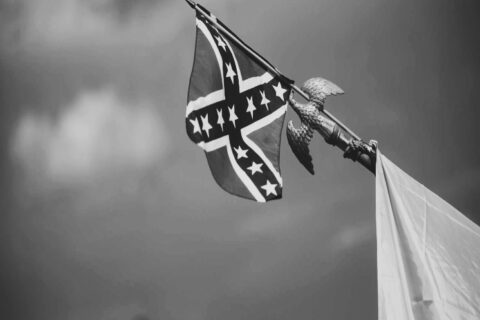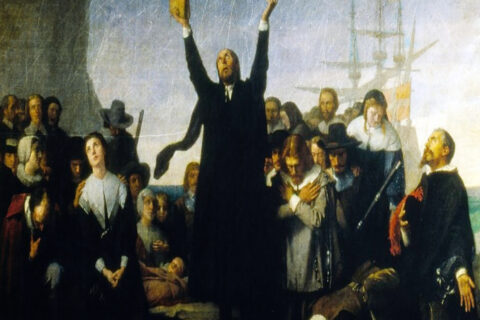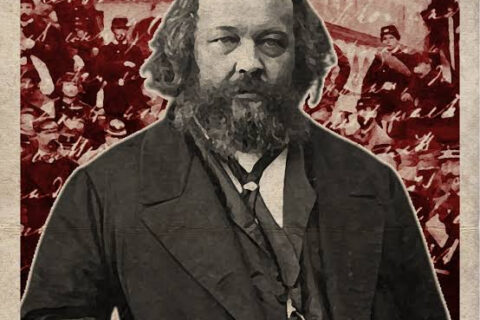If you frequent most Southern Nationalist blogs you’ll realize how much is written about the difference between the Southerner and the Yankee. And, while much of what is said is true, there hasn’t been much written that touches on our similarities and common origins. Oftentimes, Southern Nationalists refuse to recognize any good/commonality with the Yankee due to historical wrongs and current tensions.
Many will even admit kinship with other Anglosphere peoples, including our distant kin on Cuck Island. And don’t get me wrong, I’m not denying the differences, nor am I promoting the prolongation of the Union. The current Union has been unworkable since 1860, and has only gotten worse since the rise of liberalism. What I propose is that we share more in common than is sometimes admitted, despite how wayward many of them have become.
First we will define the term “Yankee” for this article. We will define the term as those who are descendants of primarily English/Scotts-Irish colonial stock and settled the land from New England to just north of the Mason-Dixon Line up until around 1800. These people have oftentimes been referred to as WASPs (White Anglo Saxon Protestant). While much of this original population has been replaced or diluted by Germans and other ethnic whites (especially, in the Upper Midwest and the large industrial cities), there still remains a remnant. These people are still to be found in much of New England, Upstate New York, Pennsylvania, scattered parts of the Midwest, and various areas of the Mountain West. Though fewer than in the past, this group continues to remain influential (not always for the best). Famous people who were/are part of this group include; John Wayne (IA), Lucille Ball (NY), T.S. Elliot (MO), Jimmy Stewart (PA), Donna Reed (IA), Gerald Ford (NE), Norman Rockwell (NY), Clint Eastwood (CA), Marilyn Monroe (CA), Bill Gates (WA), and Seth MacFarlane (CT). The maps below help illustrate this demographic;


The above map shows the percentage of the population who claims, at least in part, of English descent. The South is a lot lower in English ancestry because of the option to simply claim “American.” So, it’s likely that many of these areas are of a higher percentage. The map below is, I believe, much more accurate for the South:

As you can see on this map, most of the South is over 50% British. In addition, this map shows the states with the highest amount of Scotts-Irish. And as you can see, they really migrated almost everywhere.
Now, what are the basic similarities? First, we will talk about our common origin. Much has been written about the different kinds of Englishmen that settled this continent. It is generally said that the Tidewater and the South Carolina Low Country were settled by the English cavaliers, the backcountry by Scots-Irish, and New England by East Anglians. While this generalization holds a lot of truth, there is some crossover between regions. For example, there were many poor Southern Englishman who went to Jamestown, Virginia along with the aristocratic cavaliers. And, the Scots-Irish settled in large numbers all over the Colonies and Canada. And, southern Appalachia wasn’t exclusively Scots-Irish, but also had a large amount of English from the lowland South. While many Pilgrims emigrated from East Anglia, there were yet many others who also came from London and southwest England. Furthermore, even if we just go by these generalizations, all of our ancestors were still one kind of British or the other.
Our next commonality is that we both share a common history in the founding of the Republic. Many “SNs” (Southern Nationalists) are loyalists, and whether it was just or not is irrelevant. What I’m saying is that it’s still a part of our history. I know it’s not the 1700s anymore, and that the United States is now an empire instead of a republic. But, it’s undeniable that our Southern ancestors fought with their Yankee cousins for a cause they felt was worth fighting.
Related to the previous paragraph is our inherited form of government. Common law is a form of governance that we both, North and South, inherited from our mother country of England. Common law government is found in most countries that are (or were) part of the British Empire. Webster’s Dictionary defines Common Law as:
The body of law developed in England primarily from judicial decisions based on custom and precedent, unwritten in statute or code, and constituting the basis of the English legal system and of the system in all of the U.S. except Louisiana.
Related to common law are the rights of Englishmen. This is very old institution reaching back to the Magna Carta, and some take the history back before the Norman Conquest. The rights of Englishmen are an important part of our history because they were a key justification for declaring independence. In America’s British Culture Russel Kirk says:
The Patriots were asserting their claim to enjoy what Edmund Burke called “the chartered rights of Englishmen”- not the abstract claims of perfect liberty that would be asserted fifteen years later by French revolutionaries. Rooted in custom and ancient usage, the Common Law’s purpose was to work for social harmony, not for social revolution. The American Revolution did not sever the links between British law and American law; rather, the American Republic added more chapters to the complex history of common law.
Russell Kirk
Another shared cultural item is our folk traditions inherited from the British Isles. Now, it is true that these evolved over time into their own unique versions, but there are some similarities due to common origin. One of these things is the English Country Line Dance. This is the style of dancing that later produced Square Dancing and other variants. Alan Winston in English Country Dance and its American Cousin says:
English Country dancing went to North America with the colonists. In New England especially, country dance was extremely popular through the early 1800s. Americans eagerly awaited new dance books from England; they also wrote their own dances and published their own books… By mid-century, country dancing had retreated to, well, the country. Americans kept on country dancing in Appalachia, and in small New England towns; quadrilles spawned square dances in the Midwest. (Tom Senior reports seeing a copy of a dance manual published in Indiana by a French dancing master as he passed through in 1835, while country dancing could still support dancing masters.) In England, country dancing became the province of the villages exclusively, and most villages had only a few dances which they’d do at all their celebrations. English and American Country dance were cut off.
In addition, New England was very involved in the revitalization of English Country Dance in the early 1900s with groups like NEFFA, the New England Folk Festival.

Our musical heritage is another similarity. “Old Time Music” in particular; “Old Time Music” is basically a term used to describe traditional folk music of an Anglo-Celtic sound, which was common among rural Americans. It was usually the type that was played at country dances. It was almost always composed of a fiddler, as well as, other various instruments like the mandolin and guitar. The South (especially, the Mountain South) is the region that really made it famous. But, it was played in rural communities, to a certain degree, throughout the land up, traveling through Canada and with each region developing their own style and ballads. For a more in-depth explanation of Old Time Music read this.
The music often revolved around how and what people did for a living, as well as, legends and lore of the locality. The Deep South, for example, had a strong African influence in their songs due in part to the presence of their large slave population. Sandy Patton actually takes the position that the New England folk songs were more similar to those of the British Isles, while the South developed its own unique style.
There’s also some basic cuisine that is shared in common among the regions. This would include certain dishes like roast beef, the traditional Thanksgiving meal, pies, succotash, ales, ciders, whiskey, brandy, tea, coffee, puddings and porridge. Overall though, there remains a fairly large difference between Northern, Southern and Western foods. The colonists took the recipes that were popular in their part of England and merged them with Indian ingredients. Much of Southern food also has a strong African influence. For a more detailed description of the colonial diet check out this.
Now, the Yankees have a rich musical heritage as well. But, the South really did turn “Old Time Music” into our own unique sound. We are largely to credit for the creation of Country and Bluegrass music. We also seem to be much more known for old time fiddle music than New England. This may be due in part from our historic isolation and relative homogeneity, as well as, our slowness to industrialize.
The next thing shared in common among Americans is the historic popularity of fraternal organizations. The golden age of fraternities in America lasted from the mid-1800s all the way up until the 1950s. Common fraternities included the Masons, Odd Fellows, The Moose Lodge and The Elk Lodge. Fraternal organizations were so popular during this time that an estimated 40% of Americans were involved. They were even successful enough in the early 1800s to have a political party align against them called the “Anti-Mason Party.”
Finally, one of the biggest similarities is our Low Church Protestant tradition. This is largely a legacy of the English Reformation, The Great Awakening and the English Puritans/Presbyterians. The First Great Awakening occurred between the 1730s-1770s, throughout Britain and the Colonies. Key figures from this era included Johnathan Edwards, George Whitefield and John Wesley. It was mostly Calvinistic and was known for its emotional speaking and tent revivals, as well as, its emphasis on saving faith and being born-again. It was mostly orthodox, despite its unconventionality. Some might question the Great Awakening (especially, the Second Great Awakening, but nonetheless it shaped Southern society and is now part of our history. The Great Awakening took off largely in the Mid-Atlantic and New England regions at first, but rapidly spread through the rest of the colonies (especially, the frontier South).
The Great Awakening is largely responsible for the Methodists and Baptists becoming two of the largest Protestant denominations in Dixie. George Whitefield was one of the founders of the Methodist Church and his first mission trip was to Savannah, Georgia. Soon many unchurched Dixians on the frontier were Methodists. One should not minimize the impact of the First Great Awakening. It had a wide influence on much of the 18th century Anglo Evangelicalism. Even the Episcopal Church was influenced by it. In fact, many Episcopalians would actually attend Baptist, Methodist, or Congregational services and revivals, while remaining Episcopalian in name. And, the Episcopalian Church of the 1700s was much more low church than most of the Anglo-Catholic movement would be comfortable with. George Washington’s church only even had communion on occasion.

The Second Great Awakening was more Arminian rather than Calvinistic. And, some people like Charles Finney were basically full Pelagians. You also had a large growth of heterodox/heretical sects during this time in the “Burned Over District.” The Second Great Awakening took place from around 1800 to until the Civil War. The most troublesome of the Yankees during this time period produced some of the most harmful ideas. These include Mormonism, Millerism, Adventism, Dispensationalism, the continued growth of Unitarianism, the Shakers and the Oneida Community. The milieu of this time also spawned other destructive ideas including women’s suffrage, abolitionism and the temperance movement. Yet, many became irreligious due to skepticism. They thus fulfilled the Scripture:
That we henceforth be no more children, tossed to and fro, and carried about with every wind of doctrine, by the sleight of men, and cunning craftiness, whereby they lie in wait to deceive
Ephesians 4:14
Many SNs will dismiss anything related to the Puritans and there’s a very popular idea out there that the Puritans were basically the same as their SJW descendants. High Church folk really eat up this argument. In short, they have a problem with the Puritans refusal to submit to the Church of England, their intolerance, iconoclasm, hatred of the monarchy and their susceptibility towards utopianism. Despite these arguments, I find them unconvincing. Firstly, the New England Puritans weren’t doing anything different than the Church of England did itself, or even Calvin himself! Contrary to many neo-conservative ideas, the Puritans didn’t come to establish freedom of religion. Instead, they came to establish their own theocracy. It’s just a fact that most Christians of the 1500s and 1600s were intolerant of each other over slight disagreements. And, just because many of the Puritan descendants became heretics and social justice warriors doesn’t make them terrible people themselves. The same thing happens when modern Southerners become atheists. Humans are naturally religious, so if they don’t have Christianity, they’ll make SJWism their religion.
As an Anglican (though I lean towards the Evangelical camp) I do have problems with some of the Puritan excesses. Yet, I have similar problems with other theologians, but I can still acknowledge the good they produced. As previously stated, one cannot deny the influence that the Puritans, as well as, the Baptists of New England had on the South. Furthermore, the Puritans only rebelled against the monarchy during the English Civil War when they felt the King was commanding them to go against the Bible. 19th century Evangelical Anglican Bishop J.C. Ryle says,
The caution I wish to give respects the execution of Charles T. We shall do well to remember that the great bulk of the Puritans were entirely guiltless of any participation in the trial and death of the King. It is a vulgar error to suppose, as many do, that the whole parliamentary party are accountable for that wicked and impolitic act. The immense majority of the Presbyterians protested loudly against it. Baxter tells us expressly in his autobiography, that, together with many other ministers, he declared his abhorrence of it, and used every exertion to prevent it. The deed was the doing of Cromwell and his immediate adherents in the army, and it is at their door that the whole guilt must lie. That the great body of the Puritans espoused the Parliamentary side there is no doubt. But as to any abstract dislike to royalty, or assent to King Charles’s death, the Puritans are entirely innocent.
Furthermore, not all of the Puritan descendants became heretics or anti-Christ leftists. Even in the 1800s, there was opposition to all these things. The Nativist Movement was a reaction by the common Yankee towards the Yankee elite, who pushed mass immigration and liberalism. There is a reason the Mormons had to leave for Utah. There were still enough Yankees in Illinois, who disapproved of Joseph Smith’s polygamy and unorthodox religious beliefs, that they formed a lynch mob. The main difference comes down to the Yankee being much more susceptible to egalitarianism. The Deep South was exposed to diversity daily and Southern Appalachia remained clannish due to isolation. As a result, the South had more of an immunity. While much of the traditional Yankee culture has been wiped out or diluted, you can see from the maps that pockets of it remain throughout New England and the Midwest.
So, while Yankees aren’t the same, just like Australians or Brits aren’t, there is an undeniable commonality that exists with our Yankee brethren in the North. Dixie should continue to push for its independence, while at the same time acknowledging the similarities we do have. Traditionalist Yankee Anglos should remain a near ally, not an enemy.
To sum it up, I’ll leave you with a lyric from “Bonnie Blue Flag” –
As long as the Union Was faithful to her trust, Like friends and like brothers, Both kind were we and just.
-By Robert

O I’m a good old rebel, now that’s just what I am. For this “fair land of freedom” I do not care at all. I’m glad I fit against it, I only wish we’d won, And I don’t want no pardon for anything I done.





I really enjoyed this piece because I love diving into our history. The question is “can a Yankee be reformed?”. I don’t know. We Anglos are prone to religious fanaticism as it is and the Yankee hails from East Anglia already charged with a moral superiority complex (see Elizabeth Warren). That’s why they have no problem commiting total war. I do know, however, that you did a good amount of research with your article and I thought it was very informative.